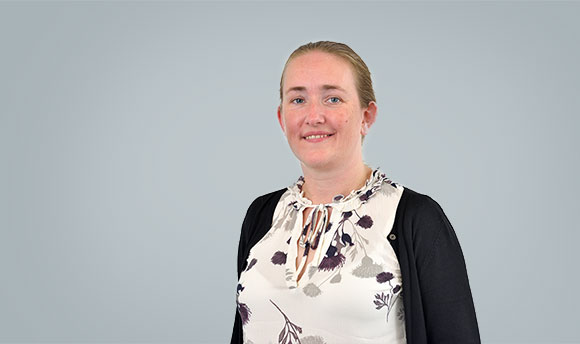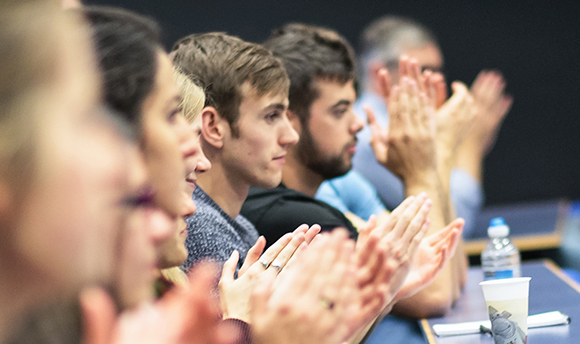In the Times and Sunday Times Good University Guide 2022, we are ranked in the top 20 UK universities for subjects allied to medicine (19th out of 82)
Master of Physiotherapy (MPhys)
This four year integrated master’s course will equip you with the expertise and practical skills that you need to work as a registered physiotherapist in the private or public health and social care sector. You will thrive in our supportive environment and benefit from placements in each year.
Why QMU?
- We are smaller by design than many universities, so you will enjoy smaller class sizes and a close, supportive relationship with our academic team.
- Be part of a vibrant, supportive and social learning community that is integrated across all Physiotherapy year groups.
- You will benefit from a carefully considered balance of theory and practical learning. Extracurricular opportunities can further develop your physiotherapy skills.
- In the Times and Sunday Times Good University Guide 2022, we are ranked in the top 20 UK universities for subjects allied to medicine (19th out of 82).
On this course you will:
- Be able to register with the HCPC and practise as a physiotherapist on graduation.
- Be able to confidently deliver safe, effective and person-centred physiotherapy care on graduation.
- Become part of a community of learners, working collaboratively with lecturers, clinical staff, service users and other students on a transformational journey towards registration.
- Carry out invaluable practice-based placements in each year that will enrich your learning. Placements will take place in a variety of real health and social care settings and you will work (supported by a registered physiotherapist) with patients, their carers and families, and with other health and social care professionals.
Physiotherapists are healthcare professionals who use person-centred approaches to make a difference to people’s lives. Physiotherapists work in a wide range of settings and focus on the management and prevention of problems relating to movement and function across the life-span.
Physiotherapy is a demanding course and we recommend that you research the career thoroughly and consider work shadowing before you come to QMU
This is a four year integrated undergraduate master’s course that leads to eligibility to apply for registration with the HCPC as a physiotherapist. Students commence the course with a view to graduating with a Master of Physiotherapy (MPhys) in four years. Years Three and Four will include some study alongside postgraduate students studying on the MSc Physiotherapy (Pre-Registration) course. There is an option for students to choose a BSc (Hons) route at the end of Year Two and they will still be eligible to apply for registration with the HCPC as a physiotherapist.
Year One
You will:
- Study a range of modules that will equip you with the basic knowledge and skills for physiotherapy practice. Topics covered include: anatomy, physiology, biomechanics, aspects of psychology, professional practice, basic assessment skills, common physiotherapy interventions and evidence based practice.
- Complete a short foundation placement to introduce you to the application of theory into practice.
Modules
- Becoming an Allied Health Professional
- Finding Your Academic Voice
- Principles of Rehabilitation
- Developing Resilience in Self and Others
- Foundations of Physiotherapy 1
- Introduction to Practice-based Learning (including two weeks Practice-based Learning)
Year Two
You will:
- Expand your skills relating to cardiorespiratory, neurological and musculoskeletal physiotherapy.
- Broaden your understanding of health and wellbeing and the role of the allied health professional in influencing health behaviour change.
- Be encouraged to develop your skills for critical thinking and using information to support your studies.
- Carry out a six-week that will give you the opportunity to continue your learning in practice.
Modules
- Foundations of Physiotherapy 2
- Cardiorespiratory Physiotherapy
- Musculoskeletal Physiotherapy 1
- Health Coaching Conversations
- Neurological Physiotherapy
- Developing a Spirit of Inquiry
- Practice-based Learning 1 (including six weeks of Practice-based Learning)
Year Three
You will:
- Develop your skills further to look at the management of people with more complex conditions.
- Broaden your awareness of healthcare and challenge your understanding of health education and promotion.
- Complete two six-week placements, further expanding your practice knowledge.
Modules:
- Musculoskeletal Physiotherapy 2
- Theoretical and Clinical Approaches to Multidisciplinary Team Working
- Understanding and Appraising the Evidence for Practice
- Advancement of Clinical Management
- Active Citizenship
- Investigation of Practice
- Practice-based Learning 2 (including 12 weeks Practice-based Learning)
Year Four
You will:
- Consolidate your practical, theoretical and professional skills through university and practice based learning (PBL) placements.
- Explore how the development of leadership, innovation and entrepreneurial skills can contribute to meeting the challenges of contemporary health and social care.
- Work with a project supervisor to plan, carry out and evaluate a small scale research project.
- Carry out two six-week placements including an elective placement
Modules
- Public Health Practice for Physiotherapy
- Professional Skills Development
- Leadership and Enterprise for Practice
- Applying Skills of Critical Enquiry (project)
- Practice based Learning 3 (including 11 weeks of Practice based Learning)
Teaching, learning and assessment
You will be taught in lectures, seminars, practical workshops and laboratories. Outside these timetabled sessions you will be expected to continue learning through both directed and self-directed study. You will be assessed using a range of methods including practical exams and written course work at the end of each module or semester.
Placements
You will complete practice placements in each year.
Placements are invaluable in consolidating theoretical study into practical expertise by working directly with patients and practice educators.
Placements take place within the NHS and social care sector at various locations across Scotland.
QMU manages the sourcing and allocation of placements for each student with the exception of the elective placement. The elective placement is organised by each individual student and provides the potential for a practice-based placement in a speciality area of interest or outside of the UK. It may be possible for you to undertake a single, elective, practice-based placement outside the UK.
To enhance future employablity placements take place across across Scotland with students normally undertaking half their placements in NHS Lothian and the rest in other health boards across Scotland. For some health boards relocation for the duration of the placement might be required unless there are individual requirements (eg specific health needs or school age children) that mean they must remain in a specific location. The additional costs associated with placement travel and accommodation are the responsibility of the student. Students who receive SAAS funding may be able to claim for some of these expenses to be reimbursed.
Careers
You can work as a physiotherapist in the NHS, in hospitals and in the community, in private practice or in industry. Some of our graduates have gone on to work as sports physiotherapists or to pursue research careers.
Entry requirements
Scottish Higher: Standard - AABBB, Minimum: ABBBB
A Level: AAB
Irish Leaving Certificate: H1 H2 H2 H2 H3
International Baccalaureate: 32 points
International: IELTS of 6.0 with no element lower than 6.0
Required subjects: Two of Biology, Physics, Chemistry or Maths at Higher/ A Level or equivalent. Scottish and Irish applicants are required to pass Higher English. English and Maths at Nat 5/GCSE.
Mature/Access: Related Access course, see: www.qmu.ac.uk/college-qualifications
We welcome applications from mature students with other relevant qualifications and/or experience. Other degree and graduate qualifications will be considered.
Direct Entry: Not available. Relevant HN qualifications may be considered for entry to Year One.
Other requirements:
- A satisfactory criminal records check is required.
- An occupational health check is required and you may be requested to be immunised against Hepatitis B.
- All students are required to obtain personal indemnity insurance, usually through membership of the professional body.
- The cost of the PVG Scheme membership and personal indemnity insurance is the responsibility of the student.
- Currently the cost of the occupational health check is funded by the Scottish Government for Scottish students only. Students from other countries are responsible for this cost. Should the Scottish Government change their funding policy the responsibility for the cost of the occupational health check may change.
Professional registration/accreditation
You will be eligible to apply for registration with the HCPC and to apply for membership of the Chartered Society of Physiotherapy.
Teaching staff, class sizes and timetables
For more information, please see ‘How we teach and how you’ll learn’.
Awarding body
QMU. For more information, please see the the 'External review' section on our ‘How we teach and how you’ll learn’ page.
View specialist facilities film
Please note:
• The modules listed here are correct at time of posting (Feb 2022) but may differ slightly to those offered in 2023. Please check back here for any updates.
• The delivery of this course is subject to the terms and conditions set out in our 2023/24 Entry Terms and Conditions (Undergraduate).
• Teaching staff may be subject to change.







